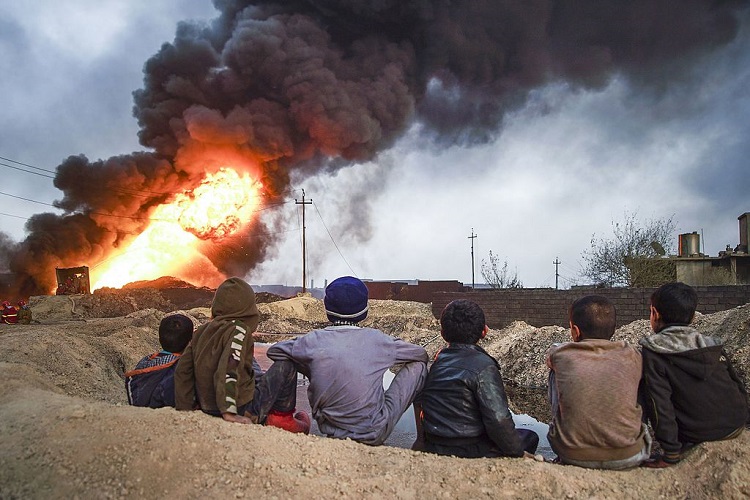News | Friday, 9th February 2018
Islamic State attracts new recruits by exploiting seventh-century 'Crusades' myths
Powerful propaganda that West is fighting an ongoing Holy War could be used again

Picture: By Mstyslav Chernov - Own work, CC BY-SA 4.0, https://commons.wikimedia.org/w/index.php?curid=54029677
Islamic State justifies its murderous violence by claiming that the West has been engaged in an apocalyptic battle with Islam since the seventh century, new research claims.
By presenting a deliberately vague and distorted timeline of ‘crusader’ aggression since the rise of Islam to recent Western interventions in the Middle East, the group might have been able to attract scores of new recruits to its cause.
And though IS is no longer able to communicate its message as effectively since being driven out of its Iraqi stronghold of Mosul in 2017, the research warns that this warped historic interpretation of the West fighting an ongoing Holy War could be used again.
Modern appropriation of Crusades
Medieval historian Dr Jason T. Roche has analysed official IS propaganda, and will present his findings at a Manchester Metropolitan University event on how the Crusades are appropriated in modern times.
Dr Roche, Senior Lecturer in Medieval History at Manchester Metropolitan University, said: “It is widely understood that the growth of violent Islamism in the Middle East and elsewhere in the world is a response to western forms of modern imperialism, so the notion propagated by IS that the West has been engaged in apocalyptic battle with Islam since the seventh century comes as a great surprise.
“The Islamic State’s physical caliphate has now largely mutated into an insurgency movement and a virtual or digital version of its former self. But the group survives, still has alternative platforms to spread its messages, and obviously recognises that people respond to the notion of western powers engaging again in “crusades”.
“Going forward, there is little doubt that the group will continue to appropriate this wildly misunderstood phenomenon.”
Analysis of propaganda
Roche examined past issues of the IS magazines Dabiq and Rumiyah to show how its portrayal of ongoing conflict allows it to claim to be agents of an apocalyptic seventh-century prophecy that Muslims would drive the ‘Roman Crusaders’ out of Syria, before an Islamic conquest of Istanbul and Rome brings forth the end of the world.
The magazines draw connections between the Shahaba who fought as companions of the Prophet Mohammed to achieve Shahada (a martyr’s death), and the likes of Khalid Masood, who killed four people in the 2017 Westminster Bridge terror attack.
He demonstrates how IS claim that they represent Islam “today in the current rounds of the mujahidin’s war” against its enemies, “at the head of which are the Crusader nations of the West.”
Going forward, there is little doubt that the group will continue to appropriate this wildly misunderstood phenomenon.
In the May 2017 issue of Rumiyah during the siege of Mosul, IS warned its supporters that “today history is repeating itself”, but the group had already assured them that the “crusaders” would be “broken and defeated, just as all previous campaigns were broken and defeated”.
The second symposium of the Northern Network for the Study of the Crusades takes place at Manchester Metropolitan University on Friday February 9th.
Different historic appropriations of the Crusades will be discussed, including during the Spanish Civil War and Second World War, and latterly the Crusader imagery used by the alt-right.




